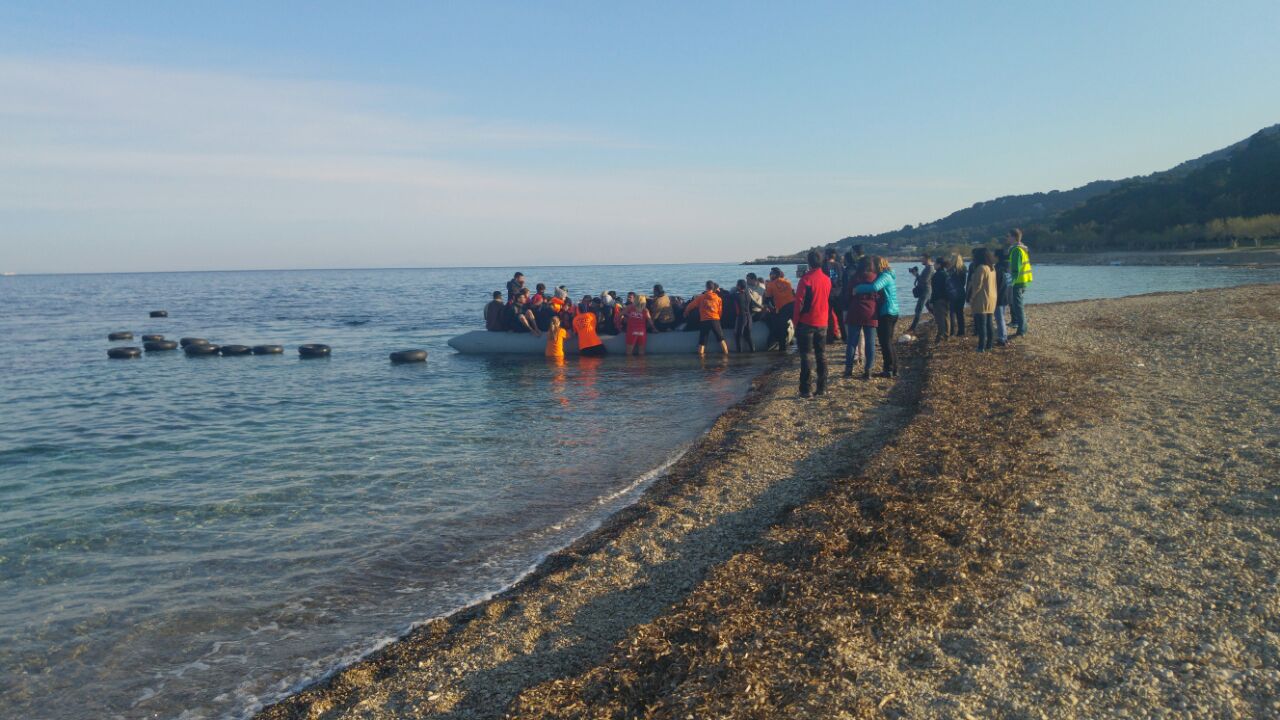I witnessed my first boat arrival last week. The boat was found by the coast guard having reached Greek waters. A rescue boat manned by volunteers was able to guide the people to safety by towing the refugee boat to an appropriate area.
When they were some distance away they seemed to be in quite good spirits. You could hear laughter as they realised that they were so close to Europe. I suppose they now felt the sense of hope and the fear of not making it here, was beginning to lift. It was a relief for me to see them in such good spirits.
As they got closer to the shore however, a sense of panic started to set in. We learn about the importance of situational awareness in medicine. The ability to mentally remove yourself from a situation, devoid of emotion and make a sensible decision can be life-saving. This frenzied scene required situational awareness from the volunteers but it could not be expected from these poor passengers. The reason for this fear may have been that armed Frontex ‘soldiers’ were on a dinghy seemingly harassing them, and as the people in the boat reached the shore they became panicked and started shouting, crying for help. Children were being lifted up and passed forward, sometimes being held over the side of the boat. It was very dangerous. The EU border police were certainly being very heavy handed and, to me, seemed to perfectly reflect the EU’s policy towards these displaced people. I believe the refugees panic was a sign of their desperation more than anything. It was clear that the border police had been trying to intercept them for some time so it doesn’t make sense that they would become panicked once they were so close to the shore. This was a much more intense situation than when we had helped them onto the ferry. There were about fifty people in a dinghy not designed for more than ten and there was real danger. The volunteers acted swiftly however and tried to calm them down.
A very disordered exit of the boat was made, from all sides and everyone was helped to shore. It was difficult not to get immersed in the situation and start helping individuals. There were about twenty volunteers helping and as the only doctor there (as far as I was aware – not always clear here), I thought it best to observe and look for any critically unwell patients. The first person I saw was a child who fainted as he got onto the shore. He was a young male who looked around ten years of age. While I was assessing him he started to regain consciousness. As it became clear he was well, he started to get up so I decided to move on and look for any one else who may have needed help more urgently.
There are a few different NGOs around and sometimes it's not always clear what everyone's role is.
The people were spread out along the shore and so I decided to take a step back to look for sick patients. I couldn’t see anyone who looked particularly unwell. Volunteers, then started coming to me and asking me to see people. I saw a little girl who was about 18 months old. She had angioedema of her R eye and a cough. The oedema had developed over 24 hours ago and her parents had bought some saline to wash it out. Both pupils were reactive and she didn’t seem like she was in any pain. She was able to fix and follow. She had some crackles on the R side but otherwise seemed fine (chest infection). Her details would need to be given to the medical staff in the camp for follow up; the UNHCR takes care of this. I then was asked to see a child who was reportedly having an allergic reaction which turned out to be a viral rash following a stomach bug. I saw a few more coughs and colds with the children but no one was critically unwell. The weather is improving now and so even though many of the refugees clothes were wet, hypothermia was not something that we were very worried about. Nevertheless we were able to provide them with emergency blankets to help keep them warm.
What happened next was difficult to watch for volunteers who had been on this island for weeks. Until about a week ago, transporting the refugees was organised by NGOs such as the UNHCR, MSF and IRC but since the EU deal, the Greek government has taken over this duty as some NGOs pulled out in protest of a deal they saw as being inhumane and of questionable legality. I’m not going to go into the specifics of the deal but the long and short of it is that the majority of refugees coming to Greece will have no chance of receiving asylum in Europe and will be sent back to Turkey.
Where previously transporting the refugees had been organised by NGOs and was to an open facility, now it was arranged by the Greek authorities and they are taken to a closed detention centre. For us volunteers it was heart breaking to know that these unfortunate people were not going to get to Europe as they had hoped. The reason I make the distinction between who was organising the transport is because it is the coast guard or police who now do this. There is obviously a very different culture within NGOs when compared with the police and this is very evident in the manner in which the boat arrivals are handled now. Refugees have the right to be treated with dignity and respect and it was very difficult for the team to watch as the refugees were herded up and ordered to get onto the bus. This coupled with the hopeless political situation made for a mournful evening as we came back to the apartment.
I find that concentrating on the medical side of things helps me keep detached from the emotion of the situation. When I stop to think about it though, it seems our governments are handling this situation with a careless disregard for the human beings caught up in this appalling war. Are their actions a reflection of our society’s attitude towards refugees? It makes me wonder what it is we fear about stretching ourselves a little to help people who really do need it.



